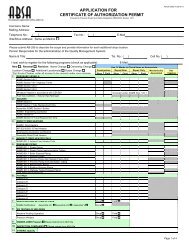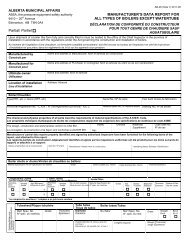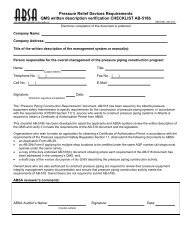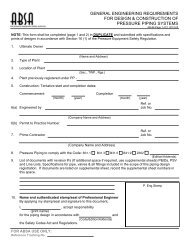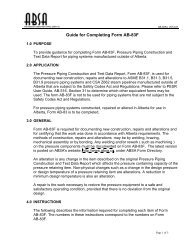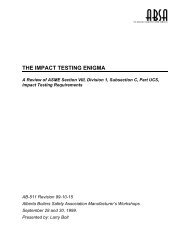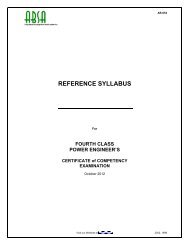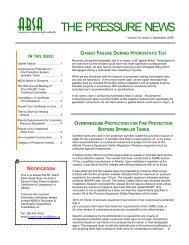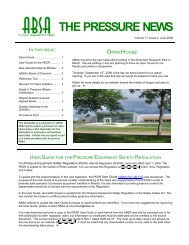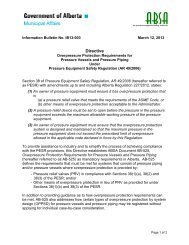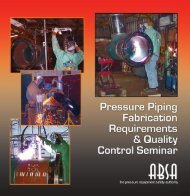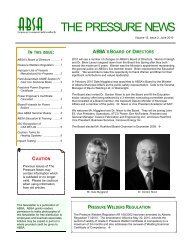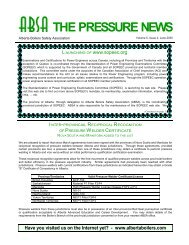The Baker Panel Report - ABSA
The Baker Panel Report - ABSA
The Baker Panel Report - ABSA
Create successful ePaper yourself
Turn your PDF publications into a flip-book with our unique Google optimized e-Paper software.
determined, based on interviews of operators, supervisors, superintendents, and operating unit training coordinators, that “gun drills haveproven to be an effective means of delivering meaningful refresher training, when executed for a mixture of both group exercises ...aswell as aone-to-one basis ....”Hourly employees repeatedly indicated during interviews that formal gun drills were sporadic at best or not conducted at all. <strong>The</strong> 2005 Carsonprocess safety management review reports that no gun drills were in place to regularly train operators on emergency “safe off” procedures forstopping operating units and equipment in a safe manner. <strong>The</strong> 2003 operator competency assurance model audit at Toledo found that gundrills and employee testing were inconsistent. <strong>The</strong> Mogford <strong>Report</strong> on the 2005 Texas City tragedy found that ‘‘[g]un drills were not beingconducted” and that “[t]he lack of gun drills to reinforce practical knowledge meant that operators’ theoretical knowledge was not completeand rarely witnessed.” 46 <strong>The</strong> Stanley <strong>Report</strong> also found that at Texas City “the utilization of gun drills is inconsistent” with the “range ofutilization go[ing] from once or twice a month to not having a gun drill in the past two years.” 47 <strong>The</strong> 2006 third-party audit report for the TexasCity refinery recommended that the refinery “[c]onsider revaluating the content and effectiveness of refresher training (including gun drills) oncritical procedures for emergency operations and emergency shutdown . . . .”Hourly employees at all refineries also stated during interviews that formal and informal mentoring was rare or nonexistent. According to a2006 behavioral safety culture assessment report for Toledo, interviewees indicated that while a formal mentoring program exists, rarely areon-the-job training mentors formally assigned to new operators. <strong>The</strong> report concluded that “[t]he result of this may be that the unit training fornew operators is unsystematic, somewhat disorganized, and susceptible to inconsistencies and contradictions.” Similarly, the 2004 CherryPoint behavioral safety culture assessment report indicates that typically, the on-the-job training is assigned to supervisors who are alreadyoverloaded. <strong>The</strong> same report indicates that in some areas of the refinery, “newbies” were training “newbies” and that while on-the-job trainingwas significantly behind schedule, employees were nevertheless being required to work at full-performance level.Refresher training. Interviewed refinery workers also commented frequently about the inadequacy of refresher training on material thatpreviously had been taught. Refinery management interviews indicated that routine refresher training on process hazard analysis or hazardand operability assessments was not generally available. Additionally, the Mogford <strong>Report</strong> states that[a]lthough efforts had been made to raise general process safety awareness and understanding in the early 1990s whenOSHA promulgated the PSM rule, this training had not been effectively refreshed over the intervening years. <strong>The</strong>re waslittle ongoing training in process hazards risk awareness and identification for either operators or supervisors/managers. PSM-related materials have been distributed through e-mails and VTA, but these communication channelsdo not appear to have been effective in maintaining awareness and understanding. 48<strong>The</strong> gap analysis performed at Texas City against the new 2006 integrity management standard also identified a deficiency in the periodicverification of personnel’s understanding of training previously received. Moreover, the 2005 HRO assessment at Cherry Point noted the lack ofan operator requalification program.Rushed training. During interviews, some employees reported pressure to complete training and to rush employees into the field. Onetraining coordinator explained that even though there was an insufficient number of trainers at Toledo, substantial pressure existed to increasethe number of qualified operators.Training resources. Information that the <strong>Panel</strong> reviewed indicates that BP has not always ensured the availability of adequate resources fortraining. <strong>The</strong> <strong>Panel</strong> is not aware of a refinery’s specific request for training resources that BP corporate management denied. Nevertheless,through its review, the <strong>Panel</strong> noted symptoms associated with inadequate training, including poor hazard awareness in various situations,such as the Whiting rupture disk situation. In addition, the <strong>Panel</strong> noted that prior reductions in training staff had taken place. However, some ofthese reductions at Texas City occurred before BP acquired the Texas City refinery.Process Safety Management Systems C 155



